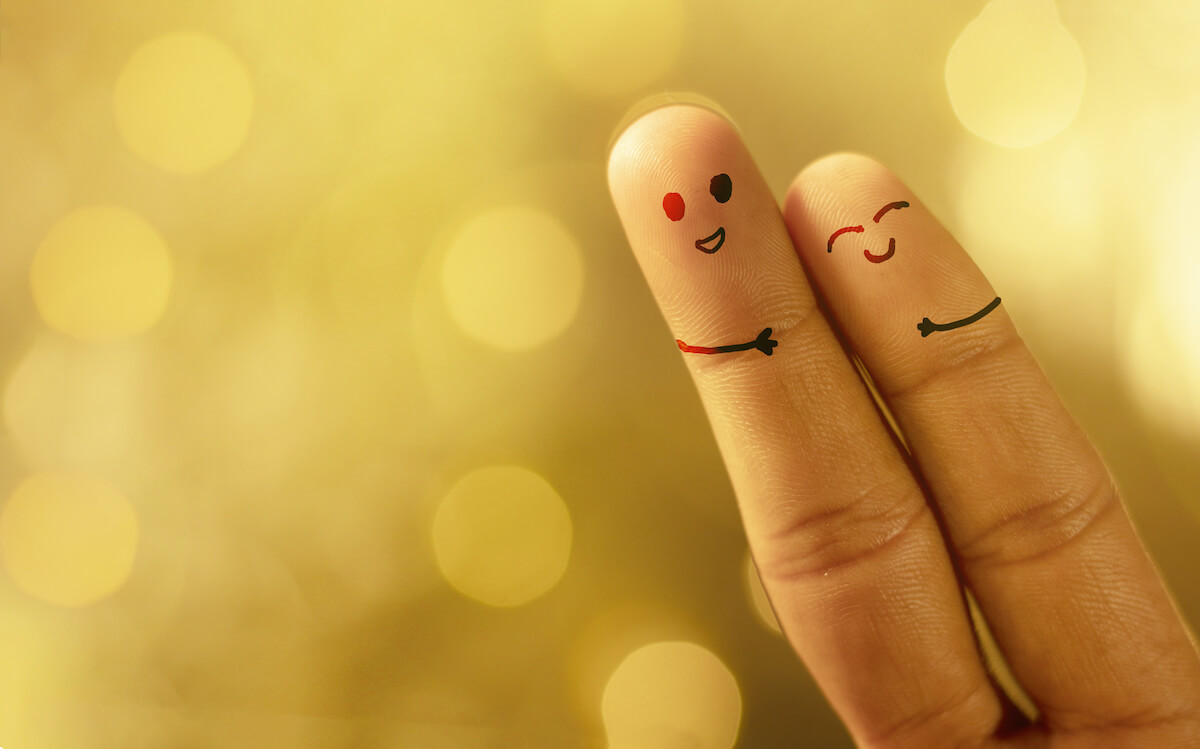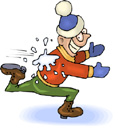How to Not Laugh at Something Funny
"I don't laugh anymore. I don't want to do anything.
I feel like crap. What gives?"
There's a difference between thinking something is funny from actually feeling it in your belly.
Having a good laugh comes with a whole body experience. The laughter erupts from within - without giving it a thought.

Author: Dr. Susan LaCombe,
Dr. LaCombe, Psychologist and Coach is a champion of nervous system health.
Greater emotional fitness is achieved using the power of tools to regulate the autonomic nervous system.
Greater emotional fitness means being healthier all round.
Updated: Dec. 31, 2021.

"I'm laughing cause I know it's funny not because Ifeel it's funny."
If your nervous system activation increases over your lifetime, chances are you'll lose your capacity for spontaneous laughter. Those folks who notice the difference in themselves might say they are "tapped out" or "I don't feel like myself".
Indeed, there's some folks who've never had the ability for a good laugh to begin with.
Don't despair. Just because you don't laugh anymore doesn't mean that can't be changed - it's temporary - unless you decide to do nothing about it.
Why you stop laughing
You may be surprised to learn that not everyone can spontaneously laugh nor can everyone experience a belly laugh. This depends to a large degree on the capacity of the nervous system to handle the activation necessary for such a physical response. (Your "activation" is a body-felt measure of the charge in your nervous system.)
And, to a large degree, the capacity depends on the neuropathways that were probably laid down in infancy. The good news is that you can optimize these pathways.
Yes, it's part of our evolutionary heritage. The nervous can LEARN.
Laughter is dependent on a nervous system that can 'let-go'
If you've ever watched a funny movie and later felt a warm, tingling feeling all over your body then you were likely discharging.
You see laughter is an ideal means of release or what we in the somatic field call, discharge.
Somatic or body-based therapists are used to seeing this issue with their clients. Clients can't easily let go—until the exhaustion beneath is literally poking through.
If this describes you, it's likely you also have a problem experiencing a full yawn in the presence of another person. The reason is, once your nervous system activation increases, your brain moves into a trauma state.
It's pretty hard in a trauma state to let go. The "high charge" in the nervous system communicates a level of danger. It has learned from thousands of years of close calls, if there's danger, it's best to stay on guard.
Furthermore, focusing on anything other than what's necessary for survival becomes a chore. That means what you think is important, isn't necessarily what's important to a brain in a trauma state.
Laughter is about having lots of 'let-go' in your nervous system
Laughter is believed to be a right brain activity with the capacity to help us feel balanced. One way that it does so is via this discharge capacity.
A healthy nervous system can manage energy well. That is, the nervous system becomes energized via stimulation (i.e. it becomes activated) and then it discharges the energy accordingly.
We move through cycles of activation and discharge naturally and efficiently (if we have a healthy nervous system) all day long.
The new therapies available (especially right-brain-based therapies e.g. body psychotherapy) more readily utilize the positive aspects of our lives but not in a mindless magical thinking sort of way. They do so from a way of directly changing how the nervous system responds.
"We don't stop playing because we grow old; we grow old because we stop playing."
George Bernard Shaw, 1856-1950
Why you need to play
I grew up in a playful family. We knew how to have fun!
Being poor, we made our own good times...like taking a cardboard box down behind the mill to use as a toboggan...or making go-carts out of old bikes and buggies.
I drew energetically from these memories for years and I imagine it made up for what I didn't get emotionally. It was a resource. (In fact, middle class living as an adult seemed rather stiff and boring in comparison 🙂

But, eventually I lost that sense of play...
Playfulness: you can't fake it.
Playfulness is one of those concepts we're all familiar with but find hard to define.
Yet, most people agree that playfulness can be both intoxicating and exciting, that it nurtures the part of us that still feels like a kid.

You cannot fake playfulness. You can fool others that you are being playful and you can try to pretend to be playful but unless it emerges from within, it won't really have that spontaneous quality, that potential for joyfulness.
You see playfulness comes with the health of your autonomic nervous system.
Playfulness is a sign of emotional fitness
Being playful is a great emotional resource. In fact, research has shown that the couple that plays together, often stays together.1
What's even more significant is that play is also very present.
The healthier we become emotionally, the easier it is to be playful. Because the healthier we become the more we are present.
It's that quality of being in the moment that makes play possible. You see, you can't play anytime but now!
If you're in therapy, look for signs that you're becoming more playful. Playfulness is a healthy sign of therapy on track.
Indeed, it might initially show up in your counseling in "play connecting moments" with your therapist.
Signs of Playfulness
The best playful moments happen spontaneously. Acting coyly or affectionately teasing your partner might be a romantic kind of playfulness. Surprising a friend with unexpected behaviour is another.
Increasing Playfulness
Some people might falsely attribute a decreasing sense of play to the natural process of aging. Others might say, life and its responsibilites become too weighty. I believe neither of these explanations are fully accurate. It's been my own counseling and my work with clients that have helped me to believe otherwise.
You see, as I proceeded in psychotherapy and as I became emotionally healthier, my sense of playfulness came back. In reflecting over the years, I realized that as I had grown older my nervous system had become more and more activated. In other words, it was dysregulated for a long time.
In other words, it was dysregulated for a long time.
The more activated we are, the harder it is for our nervous system to "let go". This letting go makes possible a belly laugh, or laughter that erupts spontaneoulsy from inside. (For more information on "letting go" see Discharge)
And, when the nervous system is highly activated, it's essentially "on alert". The fascia or muscles are pulled tight in anticipation of danger. Hormones are pulsing through your body ready for fight or flight. In this state, it's naturally going to be harder for you to relax into playfulness. Your brain is ringing alarm bells. It will be hard to "let go".
However, as your nervous system becomes more regulated, it processes energy better. You're not tapped out by the end of the day.
"The ability to play depends on the success of the work beneath, which depends on the success of the play."
"Magical Child", Joseph C. Pearse
Not everyone appreciates the value of playfulness
For many people playfulness was not something they learned or were encouraged to value in their families.
In fact, some have a hard time seeing any value in it at all. They mistakenly believe that playfulness is a sign that a person hasn't grown up. They maintain that a playful individual cannot be serious. But research suggests that being playful is not correlated with a difficulty in being serious. [In fact, I might humbly suggest that the individuals adopting this assumption may actually have a hard time being playful and haven't yet experienced the value of it.]
[In fact, I might humbly suggest that the individuals adopting this assumption may actually have a hard time being playful and haven't yet experienced the value of it.]
My Personal Musings
The field of psychotherapy will finally reach it's highest potential when people enter therapy because they feel they don't laugh enough in their lives.
Now wouldn't that be a switch!
Search for signs of laughter and playfulness in your therapist. What's modeled in front of us, has a better chance of being learned!
I always felt it was a compliment to hear from my clients that the reason they felt comfortable seeing me for counseling was the fact that they enjoyed my laugh. They said it conveyed a feeling of "normalcy".
Several others were drawn to call me because I had a website called "myShrink". This kind of humor drew them to me.
Nature never fails us as a guide. I think you'll enjoy the external resources below.
Notes
1Dr. John Gottman is famous for his research on couples. He could predict with a certain amount of accuracy which couples were going to stay together. He coded and analyzed hours and hours of videotaped interactions between couples over holiday weekends where he put them up in a condo for free. He found that couples who are playful have a better chance of staying together than those who could not play especially during times of conflict.
Playfulness between two partners--even in times of tension--can soothe the inevitable hurts and misattunements.
You can learn more about a person in an hour of play then in a year of conversation." Plato
Patterns of Play Different ways humans and mammals play. Top of the list? Attuned play...well how 'bout that!
Adults at Play The Burning Man Festival 2007 Photos (great example of pretend / creative play)
Readers Comments

Hi, I like how you pointed out that play has to be now. Regret is looking back and worry is looking forward, and play is so very now.
Do you see a reason why it could be unhealthy to have a playful attitude all the time?
Thanks for your writing, Xan
Xan (Florida, United States)

You know Xan, even people in dire straits have been known to bring levity to a situation through laughter and playfulness (which can connect us to each other faster than any well chosen words).
And just so you know, this isn't a criticism, for we all have parts of ourselves that are not fully developed; that's why everyone has at least a few issues.
The good news is that even if some of our needs were not met in chidhood, we still have our whole adult life to make up for it (although it certainly won't take that long if you follow the exercises in the Brain Coaching Program ;-))
Shrinklady

Woh, All this time I have acted playfully because I wanted to escape the reality of not having a father, and a somewhat abusive mother. (I still love her but still her methods were not humane, but we learn from other peoples mistakes) but through time my brothers rarely wanted to play and I felt neglected.
The same with people around me. Its very very depressive that people arent playful. its like i want to enjoy life and ive gone through really bad stuff, but people seem to like it cold, simple and plain.
It makes me very sad, but recently i have learned that I have to be the change i want to see in the world. I am the reason for change. And there is no more stopping me.
Thank you for your article, i was looking for something like this.
JoJo (Los Angeles, USA)

Your laugh makes me laugh....it is extremely catching, by that I mean contagious!I can understand your clients feeling comfortable with you, and then because of your laugh.
Playfulness and humour are so important in life. When I changed to a new therapist one of the things that drew me to her was her stating how important she thought humour was in one's therapy. That did it for me, and now months later I can say I 'chose' well, and am so lucky to have her as my therapist.
Sandra

That's super Sandra, glad to hear.
Shrinklady

I'm a singer and I wrote a blog post today about losing my playfulness, and how I thought it was important to become playful again in my singing practicing. I googled "how to become more playful" and found your article. It was great to read, but I was not so happy to hear that it's not something that can be faked and is a sign of emotional health. That kind of means it's going to be a byproduct of getting other things right, and that's a bit harder than I thought it was going to be.
Fresca (USA)

Hi Fresca, not to worry. Yes, that's the bad news, playfulness needs a regulated nervous system. Here's the thing though that you might find useful. If you do indeed embark on a journey towards greater playfulness, you will find that your singing may expand as well.
It's pretty hard to be out there with our voice if the hook ups aren't set up from the inside out. In other words, creativity whether from singing or playing is a right brain activity and the more that we are open, the more vibrant our experiences.
So sing on my dear,
Shrinklady

Shrinklady, I loved this article! The pictures of the husky and polar bear were amazing and I definitely think I'll be signing up for some of those workshops. : ) BTW, I remember reading an article a few years ago, unfortunately can't recall the magazine, in which they had done a study that the more playful the person, the more productive they were at work. Thanks!
Attachment Girl (Syracuse, NY, USA)

We really enjoyed this! And great pics... very interesting...will 'look' at more another time... Super
...and i see you quoted some important people ! 😛 S
Scott

I had a therapy session yesterday about my childhood trauma and felt pretty silly because I couldn't stop laughing. Still laugh every time I think of the session. I don't find the content at all funny, but still I laugh.
Thanks for normalizing that. Guess it's just part of the healing process, huh?

Yes Val that makes perfect sense...your body was discharging the energy.
What's also interesting from what you're saying is that you were also feeling "silly" which - if you're not already aware - has its roots in shame.
When clients mention that they feel "silly" laughing, I encourage them to track the sensations associated with shame in their body. In this way, the brain is learning to manage the emotion of shame in a more regulated way.
Over time, these experiences will help you move through shame and/or be less triggered into it.
Being less triggered into shame (i.e. being embarassed) was one of the best benefits that came out of my personal therapy...I'm still working on it but boy it feels so much better.
Wish you all the best in your therapy,
Shrinklady
Source: https://myshrink.com/dont-laugh-anymore/
0 Response to "How to Not Laugh at Something Funny"
Post a Comment